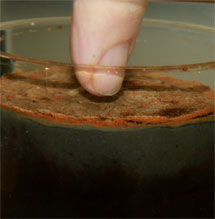 |
mud from the Bay of Aarhus Image: Nils Risgaard-Petersen |
**__Related stories:__***linkurl:In the muck;http://www.the-scientist.com/article/display/56076/
[November 2009]*linkurl:Future Oil;http://www.the-scientist.com/article/display/55376/
[February 2009]*linkurl:Nanowires common in bacteria?;http://www.the-scientist.com/news/display/23924/
[11th July 2006]





















